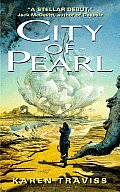
| Series: | Wess'Har #1 |
| Publisher: | Eos |
| Copyright: | March 2004 |
| ISBN: | 0-06-054169-5 |
| Format: | Mass market |
| Pages: | 392 |
Approximately two hundred years into our future, the first automated advanced probe arrived at Cavanagh's Star to prepare the way for human colonists who followed. The colonists were fleeing an environmentally exploited world and carrying a natural treasure they hoped to protect. The world was as supportive of human life as they hoped. It was also already inhabited.
One hundred years later, Shan Frankland of Environmental Hazard Enforcement is waylaid on her way home and given a Suppressed Briefing and an assignment to follow the apparently failed Constantine colony to Cavanagh's Star, a journey that will take 75 years. Her memory of the details of the briefing are masked by drugs until her brain can rebuild connections to them. All that she knows is that she was firmly convinced to take the mission.
Seventy-five years after that, Shan arrives at Cavanagh's Star in the company of a navy ship captain, a squad of marines, an assortment of competing corporate scientists, and a reporter. She finds a religious colony that isn't happy to see her, three alien races locked in a tense standoff, and Aras, the not-wholly-alien protector of the planet. And she's still not sure why she's there.
City of Pearl has received rave reviews from such reviewers as Gary Wolfe, but I kept moving past it on my shelf when looking for the next book to read. It's a first-contact story of sorts, alien politics play a large role, and it has an agrarian human colony as its main setting, which had me worried I'd be bored. The slow and somewhat confusing opening didn't help. It takes 50 to 100 pages to get the main characters settled, to build a mental map of what's going on, and to get out of a fairly generic SF opening.
What made the story start clicking for me was Shan, who starts slow but develops into one of the more interesting SF protagonists I've read about. The normal lead character in this sort of political first-contact story is either a practical-minded military officer or an idealistic scientist. Shan is neither; Shan is a cop. It takes a while to get to know Shan and see how her reactions diverge from both of those standards, but they do increasingly as the plot develops. She can do a bit of diplomacy and she feels responsible for her people, but she thinks like a police officer rather than a military leader, and there's an increasingly clear difference. It's the perfect setup for a story that's driven less by misunderstanding and exploration than by competing ideas of morality and ethics.
Traviss takes another unusual approach by making the scientists on the mission essentially villains. SF tends to idealize scientists; we don't see scientific greed nearly as often. Traviss uses them as proxies for the corporations who would love to absorb and exploit the resources of Cavanagh's Star, or who simply don't care whether their actions are exploitative, without making them caricatures. Shan is an environmental cop and dislikes them intensely; Aras doesn't like or dislike them emotionally, but has absolutely no tolerance for their interference with the world. Shan is put into increasingly difficult quandries as she tries to protect her team from Aras, follow harsh rules that she's partly sympathetic towards, and try to reconcile several aggressive sides. Her efforts become utterly engrossing. The external politics, by the time they come into play, feel like a smooth expansion of the existing complex internal politics.
This is neither a straightforward nor a preachy book, despite (or perhaps because) it has a main character who would very much like a strong moral purpose and a clear sense of right and wrong. It is written from a strongly pro-environmental angle and is likely to bug people who can't deal with that, but within that general view, Traviss sets up some wonderfully tense and complicated problems and gives the reader main characters one can whole-heartedly root for. There are major surprises throughout, including a huge plot twist at the end. I read the last hundred pages in one sitting.
Give this one a bit of time, since it starts slow and not that promisingly, but it's a great book. It is, however, quite clearly the first book of a series, and the resolution is only temporary. I immediately ordered the next couple in the series (and almost ordered the whole series to date).
Followed by Crossing the Line.
Reviewed: 2009-02-19